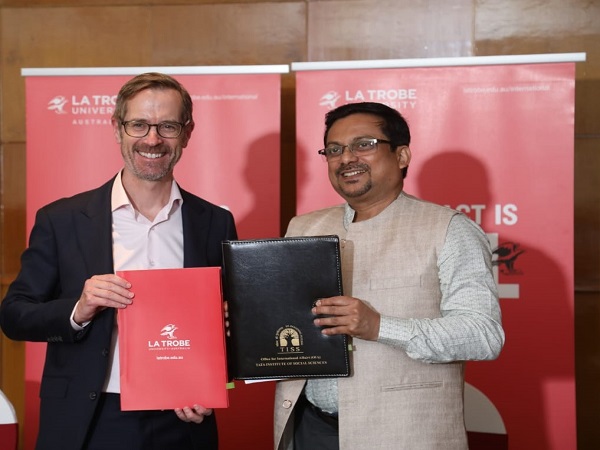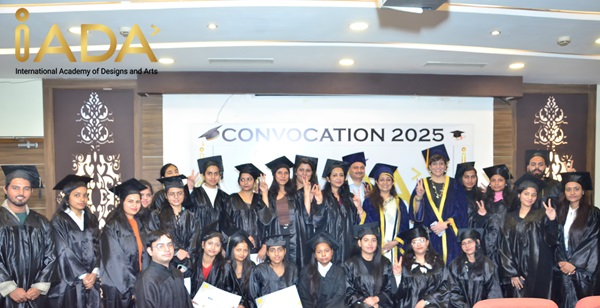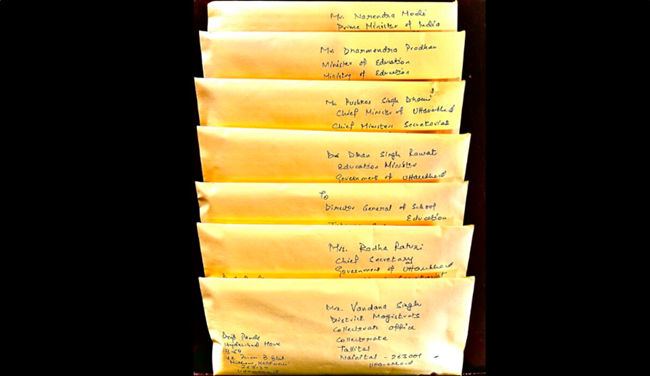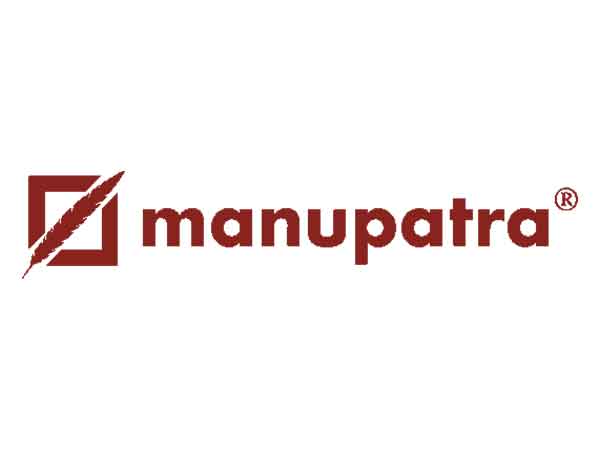Education
New La Trobe University Vice-Chancellor strengthens ties during India visit
Published
1 year agoon

Australia’s La Trobe University has identified key areas to further strengthen its longstanding commitment to Indian Research and Education partnerships during a visit by the University’s New Vice-Chancellor. Professor Theo Farrell, who began as Vice-Chancellor in February this year, has met with a range of Industry, Government and Trade Representatives during a five-day visit to the country.
La Trobe has a proud and successful history in India, partnering with tertiary institutions and organisations on projects that benefit both countries, and helping develop India’s brightest minds through joint education opportunities.
During his visit, Professor Farrell convened several Roundtable discussions with Partners, Industry and Government Representatives, on opportunities to collaborate on areas of mutual interest that address national priorities and that are important for Industry Innovation and Development.
Professor Farrell said there were several priority areas for La Trobe that presented opportunities for deepening relationships in India and developing new partnerships.
These include continuing to support and expand student exchanges in India and Australia; developing research focussed on digital technologies and skills innovations; research commercialisation opportunities, and linkages with industry partners. Deepening mutual industry partnerships play to La Trobe’s strengths in areas including smart cities, sustainable agriculture and food security, bio innovation, and in health and care innovation.
“Some of La Trobe’s most important university partners are in India, and we are building important partnerships with industry and businesses in India that leverage our significant expertise in areas including sustainable food and agriculture, health and wellbeing, technology and bio-innovation, “Professor Farrell said.
“Our expertise in bio-innovation has recently been recognised by BioNTech, one of the world’s leading biotechnology companies, who have chosen La Trobe’s Melbourne campus as the base for its new mRNA manufacturing facility to develop and test cancer treatments. “In addition, we’re committed to institutional cross-learning, joint intellectual programs and research, collaborative approaches that address industry challenges and joint educational partnerships that provide important valuable learning opportunities for students.”
Opportunities for further collaboration and engagement were also discussed at a Leadership Roundtable of all member Universities of the Asian Smart Cities Research Innovation Network (ASCRIN), which was founded by La Trobe University in 2019 and is now its Single Largest Research Internationalisation Initiative with joint investment of more than AUD $43 million (Rs 235 crores)
ASCRIN brings together a network of researchers, global industry partners, government collaborators and start-ups to advance research into smart city-related projects, helping to improve sustainability, liveability and efficiency of cities and towns in the region.
“The Network, with over 250 researchers, has already made significant strides in curating a strong portfolio of impact-based projects aimed at enhancing sustainability, liveability, and efficiency of cities and towns in the region. Our vision is now to build on this and accelerate engagement with industry and government to fast-track commercialisation and adoption pathways,” said Professor Aniruddha Desai, ASCRIN Founder and Co-Director of IIT Kanpur – La Trobe University Research Academy.
The Network has over 50 projects underway that will make a tangible difference in the lives of people in India, including:
* Data-driven decision making to improve Dairy supply chains.
* Re-using construction and demolition waste to reduce landfill.
* Intelligent planning of energy grids to optimise consumption and reduce costs.
* Using sensors to improve indoor growing conditions of medicinal crops.
* Real-time crash prediction in traffic on urban roads and intersections to increase safety of all road users.
The Tata Institute of Social Science (TISS) last year joined other leading tertiary institutions, the Indian Institute of Technology Kanpur (IIT-K) and Birla Institute of Technology and Science, Pilani (BITS-Pilani) as partners in the Network, which already includes more than 250 researchers and over 70 Joint-PhD projects.
Professor Farrell and Pro Vice Chancellor of TISS, Professor Shankar Das also announced a Joint- PhD program, which will support Indian students to conduct research addressing the growing challenges of urbanisation in Asia.
The La Trobe delegation will celebrate the finalists and winners of the Annual Technology Infusion Grand Challenge, which is designed to encourage undergraduate students in Science, Technology, Engineering and Mathematics and Business fields to be confident in their skills and knowledge to produce a solution and solve a concrete problem using next generation smart technologies.
Over 130 students in some 67 teams from 18 universities in the region submitted innovative entries.
Professor Farrell will also visit Mahindra University, where La Trobe has launched a joint Bachelor’s degree program in civil engineering.
The collaboration, initiated in 2023, aligns with India’s National Education Policy 2023 and Australia’s Education Strategy for India, offering a unique opportunity for students to pursue their Bachelor’s degree in civil engineering with two years at Mahindra University and two years at La Trobe University. Students will receive a bachelor’s degree in civil engineering from both Universities.
BACKGROUND INFORMATION
La Trobe University and India
* La Trobe University is ranked in the top 1 per cent of Universities worldwide
* Times Higher Education (THE), 2021, World University Rankings 2022; Consejo Superior de Investigaciones Cientificas (CSIC), 2021, Ranking Web of Universities.
* La Trobe has a proud record of educating students from India, with almost 11,000 people born in India amongst our alumni.
* Dignitaries La Trobe University has hosted from the Indian subcontinent include Prime Minister Mrs Indira Gandhi, Kapil Dev, Malaika Arora Khan, Amitabh Bachchan, Rajkumar Hirani, Abhijat Joshi and, most recently, actor, producer and women’s equality advocate, Shah Rukh Khan.
* La Trobe offers the Shah Rukh Khan La Trobe University PhD Scholarship, providing a life-changing opportunity for an aspiring female researcher from India to make a meaningful impact in the world.
* La Trobe University is one of only two universities in Australia teaching Hindi, and the only Australian University to teach a subject on the history, music, and storytelling of popular Hindi cinema.
* La Trobe University is one of the founding members of the Australia India Institute.
* The IIT Kanpur – La Trobe Research Academy was established in 2020.
* La Trobe has several long-standing teaching partnerships, including with Lady Shri Ram College, which has been running for more than 25 years.
* The La Trobe Library collection houses more than 38,000 volumes of monographs, journals, magazines and government publications from India, one of the largest collections in Australia.
* La Trobe has been a proud sponsor of the Indian Film Festival in Melbourne since it began in 2010.
About Tata Institute of Social Sciences, Mumbai:
The Tata Institute of Social Sciences (TISS) is one of India’s top social science institutions to study non-engineering, technology disciplines that include post graduate degrees in Public Health, Labour, Development, Urban and Public Policy, Cities and Governance, Social Work, Climate Change, Media Studies, and Rural Development among others. Many of their graduates are first generation learners from less wealthy communities and have been active participants in revitalising local communities post disasters.
With TISS’ unique study offerings combined with their students’ lived experience of environmental and social issues in the region, this partnership will further contribute to La Trobe’s ASCRIN goals. La Trobe’s humanities and social sciences academics will now have connections to their counterpart researchers at TISS, with opportunities for collaboration with local government and industries in India and Sri Lanka.
Asian Smart Cities Research Innovation Network
ASCRIN, an initiative led by La Trobe, works with research focused groups, government, global industry partners and start-ups to develop solutions and evaluate implementation strategies, to improve the sustainability, liveability and efficiency of Asian regions. This also includes a dedicated IIT Kanpur-La Trobe University Research Academy (ASCRIN’s largest node in India).
The Network has more than 250 researchers from ASCRIN partner organisations, with more than 70 Joint-PhD projects approved and 45 students so far engaged in those projects, which are exploring issues like the socioeconomic costs of road crashes in India, and how to make data driven quality management accessible to small dairy cooperatives in India.
About La Trobe University Vice-Chancellor Professor Theo Farrell
Professor Theo Farrell commenced as Vice-Chancellor and President of La Trobe University in February 2024. He brings a deep commitment to advancing academic excellence, building inclusive communities, forging external partnerships, and leading transformative change.
Website – www.latrobe.edu.au.
Media enquiries: Australia – Charisse Ede, M: +61 (0)404 030 698 or contact media@latrobe.edu.au India – Achal K Paul, achal@buzzcomm.in, M: +91 98101 62377
You may like
-


ITM SLS Baroda University Hosts CRE8-24: A Celebration of Innovation and Science
-


FinGrad’s Traders Gala 2024 Successfully Concludes in Goa, India
-


Ooberpad Introduces Devialet Phantom Theatre with Dante, Dolby Atmos and Technologies
-


Appy Pie Now Lets Users Convert Websites into Apps for Android and iOS
-


Inadev India Climbs to Top 25 in Great Place To Work India’s Great Mid-size Workplaces 2024 List!
Education
International Academy of Designs and Arts (IADA): The Institute Offering The Best Professional Courses in Fashion in India
Published
2 weeks agoon
March 21, 2025
An individual who has a love for design and a keen interest in fashion opts for a career as a fashion designer. Time and again, one has witnessed several designers from the Indian fashion industry making a name for themselves on the global stage. A person’s inherent talent and desire for excellence bears fruit when they are guided by the right minds and mentors. Founded by C.A.Sudeep Bhargava and Dr. Renu Bhargav, the International Academy of Designs and Arts has emerged as one of the most reputed institutions in India which offers courses in fashion, design and arts. In the last few years, has managed to build a reputation for itself as an institution that offers students a wide range of courses in fashion designing to choose from. These courses, apart from being well-structured, are designed to prepare students to shine and register an impact in a highly competitive industry. The fashion-related courses offered by the academy are Basic Diploma in Fashion, Advanced Diploma in Fashion, , Bachelor of Design (B.DES) in Fashion -UG, Bachelor of Vocation (B.VOC) in Fashion -UG, Master of Design (M.DES) in Fashion-PG, Fashion Styling, Apparel Merchandising, CAD Fashion Design, Boutique Management, Garment Manufacturing, Pattern Making and Design & Communication. 
Talking about what makes IADA different from other institutions in this field, co-founder Sudeep Bhargava says, “Very few institutions in the world have as many Design-based courses as we do. Design is a broad term and a student should have the right to choose what they wish to study. While somebody might be interested in fashion design, another individual could be passionate about fashion styling , Interior Design or Furniture design . By offering students a plethora of courses to choose from, we ensure they pick what they really wish to study and excel in it. We are a fashion /interior designing institute in Noida which hosts students from all across the world”.
When a student wishes to study fashion, they try to find that one fashion designing institute that will not only provide them with the right education but also prepare them to do well in the professional world. Over the years, IADA has imparted education about fashion and design to a large number of students. While some of these students work with some of the most reputed fashion brands in India and abroad, there are many who have built a name for themselves as fashion entrepreneurs as well.
Elaborating on the same, co-founder Dr. Renu Bhargav states, “A large number of students, interested in job oriented courses in fashion designing, enroll with us. While education is extremely important, the things they learn in an institute should also help them secure good jobs and earn a livelihood for themselves in the future. We consciously work towards imparting the kind of knowledge and skills to our students that will enable them to get opportunities and make a mark for themselves in the professional world”.
A while after it came into existence, IADA emerged as the most reputed fashion/Interior design institute in Noida. In the last few years, it has cemented its status as one of the best fashion institutes in the country. Apart from fashion designing course in Noida, IADA also offers a wide range of courses in interior design. The institute provides students with a very healthy educational environment and offers them the opportunity to learn from industry experts.
Education
The True Meaning of 666 in the Bible: An Exploration of the Secrets of Revelation
Published
2 weeks agoon
March 19, 2025
For many Christians, the number 666 carries a heavy connotation, often associated with the end times. This belief stems from its mention in the Book of Revelation. But what is the true meaning of this enigmatic number? The International Bible Academy offers a free online Bible course for Christians of all ages providing an array of resources aimed at helping Christians to develop a deeper understanding of Scripture and its application in everyday life. Among the myriad of topics explored in these classes, several stand out as particularly intriguing, reflecting the profound and sometimes perplexing nature of the Book of Revelation. Some of the interesting questions which will be explored in our course are:
- Why is it important for us to understand the prophecies in the Bible?
- What are the mysteries in Revelation?
- What is the Biblical reason for birth, sickness, aging, and death?
The International Bible Academy (IBA) offers much more in its curriculum beyond these highlights—each topic is meticulously designed to encourage critical thinking, open dialogue, and spiritual enrichment. It offers a holistic approach to mastering the entire 66 books of the Bible—from Genesis to Revelation. The sense of community formed within these online classrooms allows Christians from all walks of life to come together, share insights, and grow together in faith.
A Global movement of faith
Through this free online Bible class, participants join a global community of true believers. Currently, our course is established in over 600 locations across 29 countries, including the U.S., China, Japan, Canada, Germany, Netherland, France, Spain, Australia, Italy, Austria, Southeast Asia, India, Philippines, Hong Kong, and many more., Last year, thousands of believers from young students to experienced pastors joined us in deepening their faith.
Online classes are offered for convenient access.
The added advantage of an online format means that access to spiritual growth and learning is available at the fingertips of participants, no matter where they are situated. In addition to comprehensive teachings, the course offers interactive elements that encourage dialogue, community engagement, and personal growth. Students can share testimonies, ask tough questions, and seek guidance from knowledgeable and experienced instructors who prioritize an in-depth understanding of the scriptures. Our mission is to make biblical education accessible and engaging, and we believe these classes can play a vital role in your spiritual journey.
| Level | Duration |
| Basic Course | 1 month / twice a week / 1.5 hours |
| Regular Course | 8 months / thrice a week / 1.5 hours |
How do I enroll?
https://docs.google.com/forms/d/e/1FAIpQLSegHFTbn0pvVXdTUBzNIuDGqiUqF6_SwmJ4dcfLWT9m_JxJaA/viewform
Sign up today for free by scanning the QR code in the poster or through the below links and take the first step in revealing the deeper truths of the Bible. With an array of free online Bible classes available in various languages provided in India—English, Hindi, Tamil, Telugu, Kannada, and Oriya.
With the perfect opportunity to strengthen your relationship with God and learn His will, you can embark on a journey that promises spiritual growth, community, and a clearer understanding of your role in His divine plan. Don’t miss this opportunity!
www.internationalbibleacademy.in
Instagram ID: Light_of_zion_india
Facebook: Zion India
Testimonies from Pastors and believers in India
Our program has already transformed lives and inspired many, including Pastors in India who have shared their powerful testimonies. One Pastor stated, “I hope you learn about the path to heaven, which is the purpose of faith, and how God will fulfill the history of the last Bible.“ This sentiment speaks volumes about the urgency and significance of learning biblical truths.
Another Pastor emphasized the importance of the Book of Revelation by saying, “If you are a believer waiting for the Second Coming of Jesus, the Book of Revelation records when, where, to whom, and how He will come. If you hear the word and believe it, you can anchor your faith in the promises of Scripture.“ His message is clear: prepare your heart and mind for the glorious return of Christ by immersing yourself in His Word.
The testimonies continue to inspire even, with one of our students who shared their excitement about the teachings he had never encountered before. “I’ve never heard this word before, it’s completely new to me. Even after multiple biblical courses, enrolling at IBA revealed the Bible’s stunning record of God’s plan to deliver promised blessings.”
Disclaimer: The information provided in this article is for educational and informational purposes only and reflects the teachings and interpretations of the International Bible Academy (IBA). The views expressed herein are not intended to replace personal study or spiritual counsel but to encourage deeper exploration of the Scriptures. Biblical topics such as prophecy, the Book of Revelation, and related themes may involve varied interpretations across different denominations and faith communities. Readers are encouraged to approach these subjects with an open mind and to seek additional guidance from their respective spiritual leaders. Participation in the courses mentioned is voluntary, and the content should not be construed as official doctrine of any specific church or denomination.
Education
Fair Education is a Right – Let’s End the Exploitation!
Published
2 weeks agoon
March 18, 2025
- Fair Treatment for Teachers: Proper pay, better working conditions, and the respect they deserve.
- Affordable Education for Parents and Children: No unnecessary financial burdens that keep quality education out of reach.
- Support for Government Schools – These schools are shrinking, but they are the lifeline for many children. It’s time we invest in them and give them the resources they need to succeed.
- https://rb.gy/54ryek
- https://rb.gy/dds6lq
- https://rb.gy/en9cqy
- https://rb.gy/r0uj2m
- https://rb.gy/1j4bt8
- YouTube: @Haldwani_dcp
- Instagram: @haldwani_dcp
- Facebook: @deep.chandrapande
Education
Advance Your Career with Zell Education – Your Gateway to ACCA, CFA, CMA, and More
Published
3 weeks agoon
March 13, 2025
Quality education is something every Indian strives for. The desire to succeed in academics is propelled further by right guidance and mentorship. Often, an extremely hard-working student fails to achieve their goals because they are not many times, an extremely hard-working student fails to achieve their goals owing to not being guided well. Therefore, Teachers and institutions play a crucial role in a student’s academic development and successTeachers and institutions, therefore, play a crucial role in the academic development and success of a student. If an institution offers high-quality education and provides solid mentorship, the student will witness their career soar.
Founded by the visionary Pratham Barot, Zell Education has emerged as one of the leading and most reliable institutes providing finance and accounting courses that are recognized globally. Ever since its inception, Zell Education has remained committed to providing students high-quality education driven by the expertise of faculty members. The institute focuses on providing industry-relevant training that would enable students to make a mark in their professional lives.
“One of the sought-after courses at our institute is the ACCA. ACCA full form is Association of Chartered Certified Accountants, is a globally recognized certification course focused on accounting and finance. After pursuing a course in ACCA, students can work in different spheres like audit, financial management, taxation, and consulting. ACCA professionals, apart from working in public practice, can also lend their expertise in corporate and financial services. Several students, who have done the ACCA course details from our institute, are working in reputed government agencies and private organizations”, says Barot.
Along with the structured curriculum and experienced faculty members, the high success rate of the students has contributed towards the solid reputation the institute has today. Apart from ACCA, some of the other professional courses offered by the institute are CFA (Chartered Financial Analyst), CMA (Certified Management Accountant), CPA (Certified Public Accountant), Investment Banking, Financial Risk (FR) and International Financial Services (IFS).
Elaborating on what gives Zell Education an edge over other institutes, Barot states, “From the time we started, our goal has been to make things convenient and comfortable for our students. We offer flexible learning options and give our students the option to choose between offline and online learning. Our faculty members, apart from being highly experienced in the academic space, also have industry expertise. Our curriculum has been designed thoughtfully and aligns with global standards.”
For years, Zell Education has boasted of a very high passing rate. The institute provides students adequate assistance during the placement season and ensures they get professional opportunities befitting their skills, knowledge, and aptitude. Upon visiting zelleducation.com, the official website of the institute, one can get all the relevant information about the courses and certifications being offered.
Education
Manupatra Hosts Nationwide Law Teachers Conclave to Strengthen Legal Education
Published
1 month agoon
February 28, 2025
In its continued commitment to supporting the legal fraternity, Manupatra, a pioneer in legal technology, organized the Law Teachers Conclave across India’s East, West, North, and South regions in collaboration with leading law schools. This initiative aimed to enhance learning, development, and digital transformation in legal education.
By hosting the conclave at regional levels, Manupatra sought to ensure accessibility and inclusivity for educators nationwide. The conclaves were organized in partnership with:
1. West Region Law Teachers Conclave – in association with GNLU, Gandhinagar
2. South Region Law Teachers Conclave – in association with R.V. University, Bengaluru
3. North Region Law Teachers Conclave – in association with NLU, Delhi
4. East Region Law Teachers Conclave – in association with NLU, Odisha
The conclaves witnessed participation from over 1,200 law educators, including full-time, part-time, ad-hoc, and visiting faculty members from across India. These events were supported by the hosting universities and industry bodies such as SILF and GCAI.
With over 70 speakers and resource persons, the conclaves featured insightful discussions on a wide range of topics under the theme “Empowering Legal Educators for Tomorrow.”
Key Takeaways from the Conclave
The deliberations at the Manupatra Law Teachers Conclave highlighted critical challenges and advancements needed in legal education, including:
1. Integration of Technology in Legal Education – Law faculties require training in digital resources and innovative teaching methodologies to enhance student learning outcomes.
2. Pedagogical Enhancements – There is a need to transition from traditional lecture-based teaching to interactive and experiential learning, such as moot courts, case studies, and interdisciplinary approaches.
3. Practical Exposure and Industry Collaboration – Faculty members should engage more with the legal industry, including law firms, the judiciary, and corporate legal teams, to align academic teachings with real-world practices.
4. Global Competencies and Cross-Disciplinary Learning – Law schools must prepare students for international legal frameworks and develop skills in analytical thinking, project management, and professional ethics.
5. Academic Social Responsibility (ASR) – A call for stronger collaboration between academia, industry, and government to foster holistic legal education.
Recommendations for a National Capacity Building Program
In response to these observations, Manupatra is proposing a National Capacity Building Program for Law Faculty, emphasizing:
* Regular faculty development workshops and certification programs endorsed by the Bar Council of India (BCI) and University Grants Commission (UGC).
* Workshops and training sessions focusing on digital literacy, emerging legal fields, and contemporary teaching methodologies.
* A national-level digital resource hub offering curated content, research materials, and interactive teaching guides.
* Exchange programs and global collaborations to expose law faculty to international best practices.
* Mentorship programs where senior legal educators and industry experts guide young faculty members.
* Establishment of legal education research centers to enhance teaching methodologies in law schools.
* Secondment programs for law faculty to gain practical experience by working with law firms and corporations, which they can integrate into their teaching.
A well-structured, government-backed Capacity Building Program will significantly improve the quality of legal education in India and contribute to producing competent legal professionals who uphold the rule of law effectively.
Manupatra urges all stakeholders to consider this recommendation and initiate the necessary discussions to develop a framework for the Capacity Building Program. Manupatra remains committed to collaborating and providing further insights to support this important initiative.
More details https://www.manupatracademy.com/home/event
About Manupatra
Manupatra, a leading legaltech company, has been at the forefront of innovation in law and technology since 2000. Its flagship online legal research platform is the preferred tool for legal professionals, offering comprehensive legal research solutions. Manupatra also provides a suite of legal operations solutions, including contract lifecycle management, compliance management, case management, notice management, and litigation tracking.
For media inquiries, please contact: Priyanka Patel Manupatra
Email: ppatel@manupatra.com
Trending
-

 Entertainment3 years ago
Entertainment3 years agoSmall-town girl Anjali Kumari’s hottest Bollywood song “Katra Katra Again” compared to Mallika Sherawat’s
-

 Education1 year ago
Education1 year agoFostering Sustainability: Highlights and Insights from ICSE 2023
-

 Business2 years ago
Business2 years agoGreat Place To Work Recognizes LoginRadius as One of India’s Best Workplaces
-

 Technology1 year ago
Technology1 year agoCrewsphere & ICP’s Innovative Virtual Darshan Applauded by Deputy CM During Navratri at Mata Chintpurni Shrine
